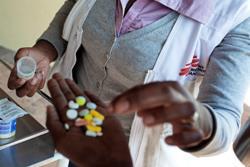Ups and downs of bipolar disorder

“I started drinking alcohol and using drugs because I felt worthless. I didn’t have any hope,” said 31-year-old Cele, who was diagnosed with the mental health condition when he was 15.
He told Health-e that he was still discriminated against by society.
Bipolar disorder is an illness that causes severe mood swings, from manic highs to deep depression. It requires treatment and support, says the South African Depression and Anxiety Group (SADAG).
Prior to starting treatment, Cele turned to traditional medicine and over-the-counter drugs for help, and when that didn’t work he went to different churches that promised miracles through prayers.
“After knocking on so many doors without being healed, I finally I made a choice to seek medical help,” he said.
Significant number
According to SADAG, bipolar disorder affects a significant number of South Africans, and usually shows in late adolescence and early adulthood.
There are several types of bipolar disorders and all involve episodes of depression and mania to different degrees.
Cele said his biggest challenge was not drinking because when he abused substances he became violent and stopped taking his medication. He sought help for his alcoholism and drug addiction and said that, with medication and counseling, he is able to manage the disorder successfully.
According to the US-based Mayo Clinic, there is no single bipolar disorder test, so a diagnosis is usually made on the basis of the symptoms meeting several criteria.
For more information on bipolar disorder call the toll-free number 0800121314, which was launched by SADAG and the Department of Social Development. – Health-e News
Author
Republish this article
This work is licensed under a Creative Commons Attribution-NoDerivatives 4.0 International License.
Unless otherwise noted, you can republish our articles for free under a Creative Commons license. Here’s what you need to know:
You have to credit Health-e News. In the byline, we prefer “Author Name, Publication.” At the top of the text of your story, include a line that reads: “This story was originally published by Health-e News.” You must link the word “Health-e News” to the original URL of the story.
You must include all of the links from our story, including our newsletter sign up link.
If you use canonical metadata, please use the Health-e News URL. For more information about canonical metadata, click here.
You can’t edit our material, except to reflect relative changes in time, location and editorial style. (For example, “yesterday” can be changed to “last week”)
You have no rights to sell, license, syndicate, or otherwise represent yourself as the authorized owner of our material to any third parties. This means that you cannot actively publish or submit our work for syndication to third party platforms or apps like Apple News or Google News. Health-e News understands that publishers cannot fully control when certain third parties automatically summarise or crawl content from publishers’ own sites.
You can’t republish our material wholesale, or automatically; you need to select stories to be republished individually.
If you share republished stories on social media, we’d appreciate being tagged in your posts. You can find us on Twitter @HealthENews, Instagram @healthenews, and Facebook Health-e News Service.
You can grab HTML code for our stories easily. Click on the Creative Commons logo on our stories. You’ll find it with the other share buttons.
If you have any other questions, contact info@health-e.org.za.
Ups and downs of bipolar disorder
by cynthiamaseko, Health-e News
April 2, 2019



